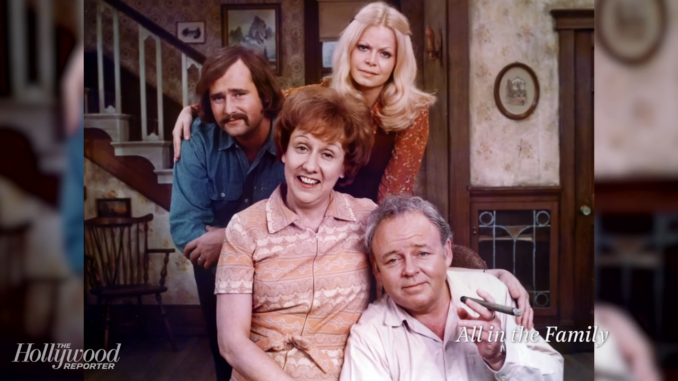
When we think of the classic sitcom protagonist, we often picture someone charming, likable, and easy to root for. But in 1971, All in the Family introduced us to a character who defied all of these conventions. Archie Bunker, the show’s main character, was anything but the ideal leading man. He was opinionated, bigoted, and frequently offensive, yet somehow, he became one of the most memorable—and beloved—characters in television history.
Archie’s flaws were not merely the source of comedic relief; they were a reflection of the social and political tensions of the time. His character broke the mold of the typical sitcom protagonist, and in doing so, he changed the way audiences viewed television heroes. But how did Archie Bunker, an anti-hero by most standards, become the face of one of the most successful shows in TV history?
The Creation of Archie Bunker:
Archie Bunker was a character that was intentionally crafted to provoke. Created by All in the Family’s producer and writer, Norman Lear, Archie was designed to be the embodiment of the working-class, middle-aged, conservative American man. Lear wanted to create a character who represented the societal mindset of the time—one that was rooted in outdated, often harmful views on race, gender, and politics.
Carroll O’Connor’s portrayal of Archie was key to the character’s success. O’Connor brought a humanity to the role that made Archie’s offensive views both funny and tragic. He wasn’t a one-dimensional character who existed solely to be ridiculed; rather, he was a complex man whose behavior reflected the political and social struggles of the time. In many ways, Archie was a symbol of America’s growing cultural divide.
The Humor in Archie’s Bigotry:
One of the most remarkable aspects of All in the Family is the way it used Archie’s bigotry as a comedic tool. On the surface, his racist, sexist, and xenophobic views could be seen as deeply offensive. But the show didn’t simply portray these views as funny in and of themselves; it made a point of highlighting how absurd they were, often at Archie’s own expense.
Through the character of Archie, All in the Family satirized the attitudes of many working-class Americans during the 1970s. The show allowed viewers to laugh at Archie’s ignorance while simultaneously forcing them to confront the real-world consequences of such attitudes. This balance of humor and critique was one of the reasons the show was so revolutionary. It made people question their own beliefs while still providing the entertainment value that audiences craved.
The Audience’s Reaction:
When All in the Family first aired, many viewers were shocked by Archie’s offensive behavior. Some found his bigoted remarks to be unacceptable, while others were drawn to the show precisely because of its unflinching portrayal of uncomfortable truths. The character of Archie Bunker became a lightning rod for both praise and criticism, but one thing was clear: audiences had never seen anything like it before.
Interestingly, while many viewers initially found Archie’s behavior shocking, they quickly became captivated by the complexity of his character. Over time, people began to appreciate the nuance behind his offensive statements. Archie wasn’t just a stereotype; he was a reflection of a particular segment of society that was struggling to adapt to the changing social and political landscape. By presenting him as a flawed, three-dimensional character, All in the Family forced viewers to confront the uncomfortable realities of prejudice and ignorance.
Archie’s Role in the TV Landscape:
Archie Bunker was a departure from the traditional sitcom protagonist. Rather than being a likable, morally upstanding hero, he was a deeply flawed, sometimes hateful man. But this is exactly what made him such a revolutionary character. In a television landscape that often sanitized the complexities of life, Archie Bunker was real. He wasn’t meant to be a role model, but rather a mirror to society.
The success of All in the Family proved that audiences were ready for a more complex kind of protagonist—one who didn’t fit into the traditional mold of the “good guy.” Archie’s presence on television paved the way for a new kind of anti-hero, one that would become increasingly popular in the years to come. Shows like The Simpsons, Family Guy, and Arrested Development all owe a debt to the character of Archie Bunker, who proved that sometimes, the most interesting characters are the ones who aren’t easily defined as “good” or “bad.”
Conclusion:
Archie Bunker was not your typical sitcom hero. He was crass, bigoted, and often offensive, yet somehow, he became one of the most beloved and influential characters in television history. Through his character, All in the Family redefined what it meant to be a leading man on TV. Archie’s flaws made him human, and his complexity made him unforgettable. Today, he stands as a symbol of how television can be both entertaining and thought-provoking, challenging audiences to rethink their views while still delivering laughter along the way.
